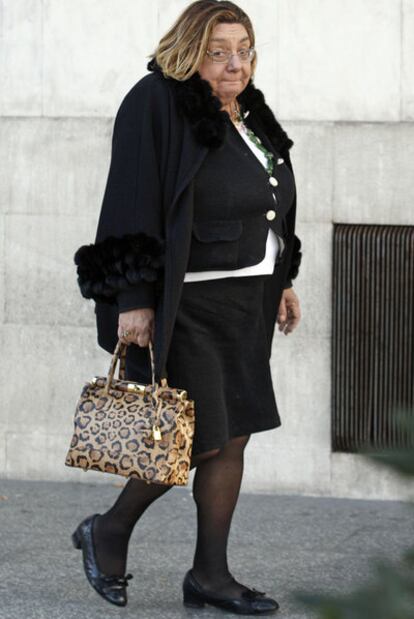The judge who sees conspiracies
Nearly eight years after the Madrid bombings, one magistrate still has her doubts
A Madrid court has spent the past two-and-a-half years investigating whether a police chief from the special explosives unit (Tedax) is guilty of criminal conduct relating to the Madrid train bombings of March 11, 2004, which left 191 people dead and more than 1,800 wounded.
Commissioner Juan Jesús Sánchez Manzano, who was appointed by the Popular Party (PP) government of José María Aznar, is charged with concealing and manipulating evidence, and failing to pursue the case diligently.
The case has become a springboard for some of the loudest conspiracy theories once upheld by PP leaders in connection with the attacks, which took place three days before the 2004 general elections, and, according to sectors of the PP, helped the opposition Socialists win.
Despite a 2007 High Court ruling that the criminal attacks were perpetrated by Jihadists, conservative-leaning media continue to run stories suggesting it was Basque terrorist group ETA who carried out the atrocity, and that the Socialist Party and some police officers knew it was going to happen.
The High Court investigated these and other allegations between 2004 and 2007, but the Supreme Court upheld that all of these theories were unfounded.
But the conjecture has found a sympathetic ear in Madrid's courtroom number 43, presided by Judge Coro Cillán, who was recently upbraided by the General Council of the Judiciary (CGJP), the judicial watchdog, for favoring a close friend in a case involving a Madrid nightclub.
The original lawsuit against police chief Sánchez Manzano was brought in July 2009 by an 11-M victim support group, but since then it has been joined by terrorists who were convicted of the attacks, their relatives, as well as by an extreme right-wing group, a Civil Guard association and the Victims of Terrorism Association (AVT). All of the complaints were admitted by Judge Cillán as part of the private prosecution; all of them argue that the former head of the explosives unit deliberately destroyed or manipulated evidence to cover up for the real perpetrators.
Before that, another Madrid courthouse had received a similar complaint against Sánchez Manzano from a right-wing party called Alternativa Española. That judge threw the case out of court, arguing that "the penal jurisdiction is being spuriously used with the goal of initiating criminal proceedings." Success was met on another try in Cillán's court.
The judge discovered that on March 11, 2004, agents from the Tedax unit collected samples or remains of the explosives used for the attacks, but failed to document them properly. The Madrid Tedax team, led by a policeman named Cáceres Vadillo, blame the Central Unit, whose boss was Sánchez Manzano, for that oversight. The judge is also investigating why these samples were analyzed at Tedax facilities rather than being sent along to the forensic police unit, another alleged breach of protocol. All the Tedax members who gave testimony in court denied that Sánchez Manzano concealed or gave orders to conceal fragments from the explosives, or asked to modify expert reports.
Cillán also looked into the alleged ETA connection, calling in Germán González, a Civil Guard general posted in the Basque province of Gipuzkoa when 11-M took place, to give testimony on November 23. He said he was not aware whether there had ever been "meetings in Austria or Switzerland for negotiations with ETA." No police chief involved in the 11-M investigation ever gave any credibility to the theory that ETA participated in the attacks.
Only a fortnight ago, Judge Cillán subpoenaed a now-suspended policeman named Inspector Mosquera, who had told another judge in Lugo that a friend of his - a secret agent at CNI who went by the name of Walter - had informed him that prior to 11-M there had been a meeting in Geneva between the secret services of Morocco, Bulgaria, France and Spain, with the participation of a Socialist leader and a policeman, with the goal of setting up the attacks.
Finally, Cillán is also pursuing another theory that somebody ordered the wrecked train cars to be scrapped just a few days after the attacks in order to destroy the evidence within - that is despite the existence of lengthy, comprehensive reports by Tedax and Civil Guard experts regarding the contents of the cars.
Inside Madrid's courtroom number 43, the 11-M conspiracy theories continue to thrive seven years after the events.

Tu suscripción se está usando en otro dispositivo
¿Quieres añadir otro usuario a tu suscripción?
Si continúas leyendo en este dispositivo, no se podrá leer en el otro.
FlechaTu suscripción se está usando en otro dispositivo y solo puedes acceder a EL PAÍS desde un dispositivo a la vez.
Si quieres compartir tu cuenta, cambia tu suscripción a la modalidad Premium, así podrás añadir otro usuario. Cada uno accederá con su propia cuenta de email, lo que os permitirá personalizar vuestra experiencia en EL PAÍS.
¿Tienes una suscripción de empresa? Accede aquí para contratar más cuentas.
En el caso de no saber quién está usando tu cuenta, te recomendamos cambiar tu contraseña aquí.
Si decides continuar compartiendo tu cuenta, este mensaje se mostrará en tu dispositivo y en el de la otra persona que está usando tu cuenta de forma indefinida, afectando a tu experiencia de lectura. Puedes consultar aquí los términos y condiciones de la suscripción digital.








































